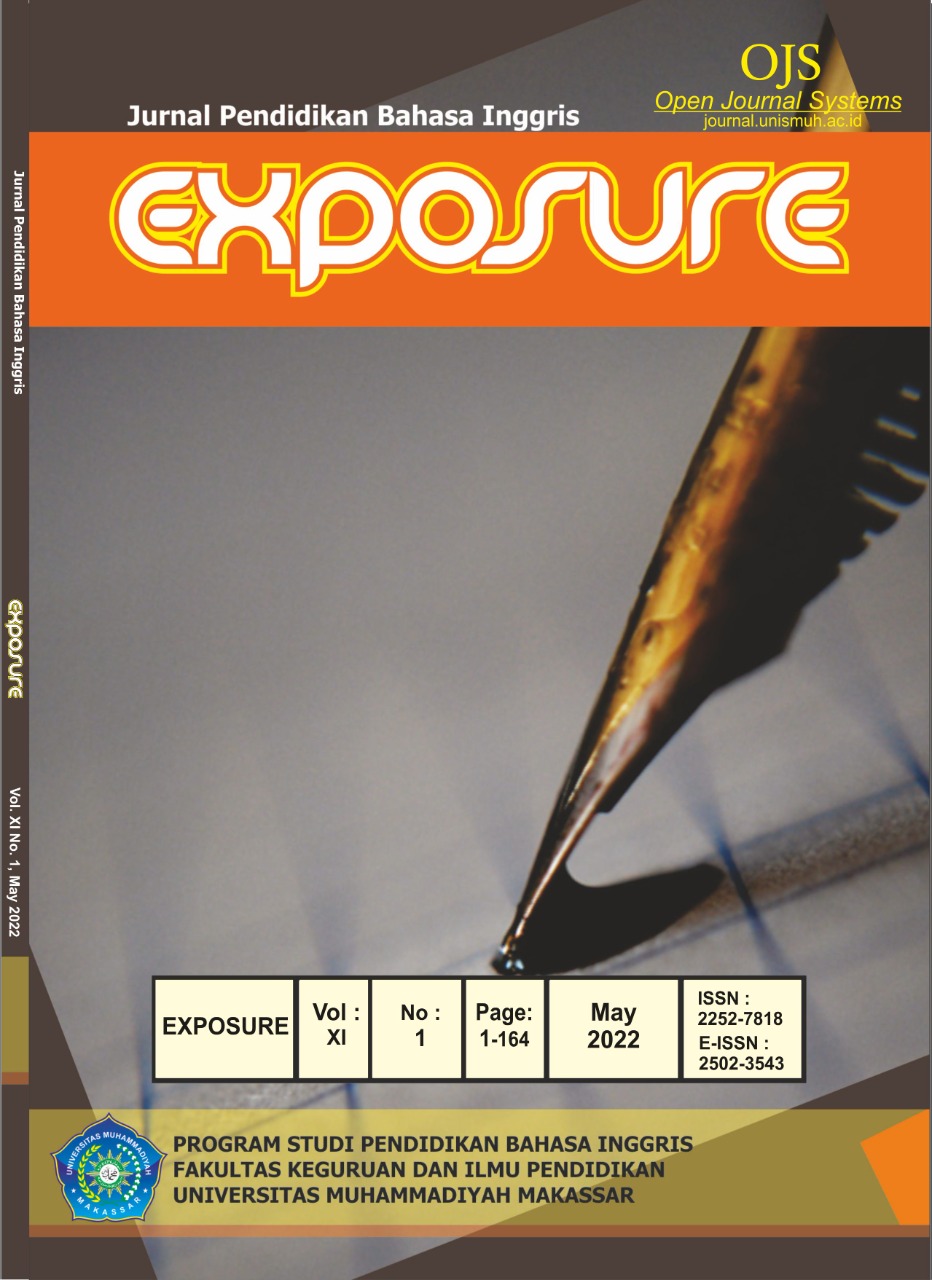EXPLORING ILLOCUTIONARY ACT OF OPRAH WINFREY AND J.K. ROWLING IN OPRAH WINFREY SHOW EXCLUSIVE
DOI:
https://doi.org/10.26618/exposure.v11i1.7265Keywords:
speech act, illocutionary act, talk showAbstract
Illocutionary act is one type of speech acts which refers to the attempt to accomplish some communicative purpose and the extra meaning of the utterance produced on the basis of its literal meaning. This paper investigated the illocutionary act in talk show used by Oprah Winfrey and J.K Rowling. The focus of this paper is to explore the five types of illocutionary act used in utterances of Oprah Winfrey and J.K Rowling. Those five types are representative (reporting, stating, and concluding), directive (ordering, asking and requesting), commissive (offering, promising, and pledging), expressive (praising, thanking, and apologizing), and declarative (deciding). The writer used qualitative method. To collect the data, the writer transcribed the utterances of talk show and analyzed the context and classifications of illocutionary act by using discourse analysis approach. The illocutionary act used by Oprah Winfrey and J.K Rowling in talk show were analyzed based on the theory of Searle (1969). The findings showed that the utterances in talk show often use questions from Winfrey as the interviewer while Rowling as the interviewee produced the clear utterances. Findings exemplified the utterances such as thank you, pretty good, and I couldn’t stop that can be categorized as thanking in representative, praising in expressive, and deciding in declarative.
References
Austin, J. L. (1962). How to Do Things with Words. Oxford: Clarendon Press.
Birner, Betty J. (2013). Introduction to Pragmatics. Malden, MA: Wiley – Blackwell.
Cummings, Louisse. (2005). Pragmatics: A Multidisciplinary Perspective. Edinburgh: Edinburgh University Press Ltd.
Cutting, Joan. (2002). Pragmatic and Discourse. New York and London: Routledge.
Gee James. Paul. (2011). How to Do Discourse Analysis: A Toolkit. New York and London: Routledge.
Huan, Yan. (2005). Pragmatics. New York: Oxford University Press Inc.
Leech, Geoffrey N. (1983). Principles of Pragmatics. New York: Longman Inc.
Martin, J. R. (2001). Cohesion and Texture in D. Schriffin, D. Tannen, H. & E. Hamilton (Eds.) the Handbook of Discourse Analysis (pp. 787 – 797). USA: Blackwell.
Mc. Carthy, M. (1991). Discourse Analysis for Language Teachers. New York: Cambridge University Press.
Schriffin, D. (1994). Approaches to Discourse. UK: Blackwell Publishers Ltd.
Searle, J. (1969). Speech Acts. Cambridge: Cambridge University Press.
Yule, George. (1996). Pragmatics. Oxford: Oxford University.
Downloads
Published
Issue
Section
License
Authors who publish with this journal agree to the following terms:
In order to assure the highest standards for published articles, a peer review policy is applied. In pursue of the compliance with academic standards, all parties involved in the publishing process (the authors, the editors and the editorial board and the reviewers) agree to meet the responsibilities stated below in accordance to the Journal publication ethics and malpractice statement.
Duties of Authors:
- The author(s) warrant that the submitted article is an original work, which has not been previously published, and that they have obtained an agreement from any co-author(s) prior to the manuscript’s submission;
- The author(s) should not submit articles describing essentially the same research to more than one journal;
- The authors(s) make certain that the manuscript meets the terms of the Manuscript Submission Guideline regarding appropriate academic citation and that no copyright infringement occurs;
- The authors(s) should inform the editors about any conflict of interests and report any errors they subsequently, discover in their manuscript.
Duties of Editors and the Editorial Board:
- The editors, together with the editorial board, are responsible for deciding upon the publication or rejection of the submitted manuscripts based only on their originality, significance, and relevance to the domains of the journal;
- The editors evaluate the manuscripts compliance with academic criteria, the domains of the journal and the guidelines;
- The editors must at all times respect the confidentiality of any information pertaining to the submitted manuscripts;
- The editors assign the review of each manuscript to two reviewers chosen according to their domains of expertise. The editors must take into account any conflict of interest reported by the authors and the reviewers.
- The editors must ensure that the comments and recommendations of the reviewers are sent to the author(s) in due time and that the manuscripts are returned to the editors, who take the final decision to publish them or not.
Authors are permitted and encouraged to post online a pre-publication manuscript (but not the Publisher’s final formatted PDF version of the Work) in institutional repositories or on their Websites prior to and during the submission process, as it can lead to productive exchanges, as well as earlier and greater citation of published work (see The Effect of Open Access). Any such posting made before acceptance and publication of the Work shall be updated upon publication to include a reference to the Publisher-assigned DOI (Digital Object Identifier) and a link to the online abstract for the final published Work in the Journal.

